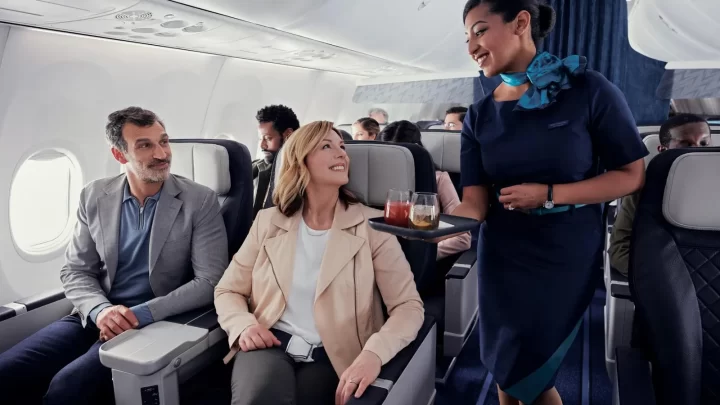When selecting an airline, it is essential to carefully consider your personal priorities. These may include factors like cost, convenience and flight schedules. Furthermore, consider reputation and service quality before making your selection.
As part of their business travels, many business travelers take note of an airline’s loyalty programs. Many business travellers collect frequent flyer points in order to earn free flights and other perks. This will help you get great deals, as what is the case with airlines like Cathay Pacific Flights.
Convenience
Convenience is often the cornerstone of choosing an airline, but it is essential to remember that not all carriers are created equal. While one may cost less, its schedule might be more demanding or require multiple connections before reaching your destination. Finding an airline with convenient services for your travel plans will ultimately save time and money in the long run.
As a business traveller, it is vital to consider an airline’s airport experiences and business-friendly amenities when making travel decisions. Such amenities could make the difference between an unpleasant journey and one filled with comfort and productivity – for instance an airline offering priority check-in and fast track security can save time and hassle; plus access to business lounges will provide ample opportunity to relax before take-off.
Consider comfort and customer service when selecting an airline. Look for one offering complimentary food and beverages on board, free airport transfers, luggage allowances, and in-flight entertainment as part of its services.
Airline loyalty programs should also be an important factor for frequent flyers. These programs may offer benefits like free flights and upgrades as well as money savings on future travel plans. Not all airlines provide these perks so it is wise to carefully evaluate each airline before making your choice.
An excellent airline should put employee satisfaction first and offer an exciting work environment, something which you can learn by reading reviews and job listings on social media. Also look for airlines that promote positive culture while boasting outstanding safety records.
Flight schedules
Flight schedules are typically determined several months in advance; however, even this long lead time can still be disrupted by inclement weather or other unforeseen circumstances. Flight times also fluctuate based on passenger volumes en route; thus airlines must build in extra padding to guarantee all flights depart and arrive on schedule – or face losing revenue for each delayed aircraft rotation.
What flights an airline is able to schedule depends on a variety of factors, such as its base and equipment (commonly referred to as its “fleet”) as well as pilot preferences. For instance, United’s Boeing 757/767 pilot in Newark might have different flying preferences from Alaska’s A320 pilot based out of Los Angeles; JetBlue and Delta compete with one another for New York City market.
At the core, it falls to an airline’s schedule planning team to craft an effective network. Too much padding may negatively impact their financial standing while inadequate planning may lead to reduced performance and missed growth opportunities.
Frequent flyer programs
Frequent flyer programs are loyalty schemes provided by airlines to their recurring customers as a reward for flying more frequently with them and reduce carbon emissions. Some programs can have restrictions such as advance reservation requirements and blackout dates, which can make earning frequent flyer rewards harder for travelers.
Loyalty programs can make or break an airline, so it’s crucial that they are carefully evaluated before joining. You can do this by reviewing promotional materials or contract associated with rewards program rewards programs and paying close attention to notices sent after enrolling as these may outline changes to frequent flyer policies and/or file complaints with the Department of Transportation if you feel neglected by an airline’s treatment of its frequent flyer program members.
Frequent flyer programs are critical for airlines, who don’t make much money from ticket sales alone. Airlines rely heavily on fees such as baggage charges and frequent flyer programs for revenue generation – these fees make up around 50% of profits! Airlines credit cards may also provide value to consumers; therefore many prefer earning their rewards through them rather than directly through an airline.
Many airlines offer frequent flyer programs, with the right one depending on your home airport, travel destinations and preferred airline. When selecting an airline to partner with for frequent flights to your desired destinations and presence in your home airport. Also important are any airline alliance benefits as well as how easy it is to accumulate and redeem miles.
Personal preferences
Personal preferences play an integral role when selecting an airline. If traveling on business, amenities such as comfortable seats, in-flight entertainment options and complimentary snacks may help to ensure that you arrive refreshed and prepared to take on each day’s tasks. If traveling with young children may also prefer an airline that provides family-friendly seating arrangements.
Another consideration should be the airline’s fleet of aircraft and flight schedules. For instance, if you frequently hold meetings in the UK, selecting an airline with frequent flights might save both time and money by eliminating the need to book multiple tickets separately.
Additionally, consider an airline’s frequent flyer programs when making your selection. If you travel frequently, choosing an airline that provides generous frequent flyer rewards or allows you to redeem points for free flights can make an experience that much sweeter – bicoastal travel blogger VeloNomad collects frequent flyer miles like VeloNomad does and these rewards can save on airfare while making every journey even more exciting!
Finally, it is vital that you carefully consider an airline’s compensation and career development opportunities. When starting out as a pilot, it is key that your career development be prioritized at an airline with resources designed to facilitate it; similarly, avoid those without competitive salaries.



